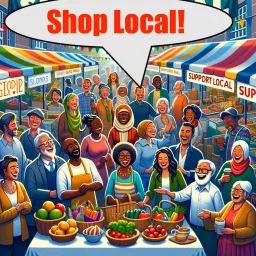Shop Local

The Power of Shopping Local: Supporting Your Community and the Environment
In an era of globalization and the dominance of large corporations, the concept of "shopping local" has gained significant traction. It is a movement that encourages consumers to prioritize purchasing goods and services from locally owned and operated businesses rather than multinational chains or online giants. While the convenience and lower prices offered by these larger entities may be tempting, the benefits of shopping local extend far beyond the immediate transaction. By supporting local businesses, we invest in the well-being of our communities, promote economic resilience, and contribute to a more sustainable future for ourselves and the planet.
The Economic Benefits of Shopping Local
One of the most compelling reasons to shop local is the direct economic impact it has on our communities. When we spend our money at locally owned businesses, a larger portion of that money remains within the local economy. Studies have shown that for every $100 spent at a local business, approximately $68 stays in the community, compared to only $43 when spent at a national chain. This is because local business owners often rely on other local suppliers and service providers, creating a multiplier effect that strengthens the entire economic ecosystem.
Moreover, local businesses are the backbone of job creation in our communities. Small businesses account for the majority of new jobs in the United States, and they are more likely to employ local residents than larger corporations. By supporting these businesses, we are helping to create and sustain employment opportunities for our neighbors, friends, and family members. This, in turn, leads to greater economic stability and a higher quality of life for everyone in the community.
In addition to job creation, shopping local also promotes entrepreneurship and innovation. Local business owners are often more attuned to the specific needs and preferences of their community, and they are more likely to take risks and try new things to meet those needs. This fosters a culture of creativity and experimentation that can lead to the development of unique products and services that set a community apart. By supporting these entrepreneurs, we are investing in the future of our local economy and helping to create a more vibrant and diverse business landscape.
The Social Benefits of Shopping Local
Beyond the economic benefits, shopping local also has significant social advantages. Local businesses are often deeply rooted in their communities, and they play a vital role in creating a sense of place and belonging. They are the gathering spots where neighbors meet to catch up over coffee, the sponsors of little league teams and community events, and the familiar faces that greet us when we walk through their doors.
This sense of community is especially important in an age where social isolation and disconnection are on the rise. By frequenting local businesses, we have the opportunity to build relationships with the people who serve us and to feel a sense of connection to the place where we live. This can lead to greater social cohesion, trust, and civic engagement, all of which are essential for building strong and resilient communities.
Shopping local also allows us to have a greater say in the character and values of our community. Local business owners are often more responsive to the concerns and feedback of their customers, and they are more likely to make decisions that align with the values of the community. By supporting businesses that share our values, whether it's a commitment to sustainability, fair labor practices, or community involvement, we are helping to shape the kind of community we want to live in.
The Environmental Benefits of Shopping Local
In addition to the economic and social benefits, shopping local also has significant environmental advantages. One of the most obvious is the reduction in transportation emissions. When we buy products that are made or grown locally, we are cutting down on the distance that those products have to travel to reach us. This means fewer trucks on the road, less fuel consumption, and lower greenhouse gas emissions.
In contrast, when we buy products from large corporations or online retailers, those products often have to be shipped from distant warehouses or even from overseas. This not only increases the carbon footprint of those products but also contributes to air and noise pollution in the communities where those warehouses and distribution centers are located.
Shopping local also helps to promote more sustainable land use practices. Local farmers and producers are often more invested in the long-term health of their land and are more likely to use sustainable farming methods such as crop rotation, composting, and natural pest control. By supporting these producers, we are helping to preserve farmland and green spaces in our communities and to promote biodiversity.
Moreover, local businesses are often more connected to the natural resources and ecosystems of their region. They have a vested interest in protecting and preserving those resources for future generations. By supporting businesses that prioritize sustainability and environmental stewardship, we are helping to create a more resilient and sustainable local economy that can withstand the challenges of climate change and resource depletion.
Challenges and Opportunities for Shopping Local
Despite the many benefits of shopping local, there are also challenges and barriers that can make it difficult for consumers to fully embrace this approach. One of the biggest challenges is the perception that local products and services are more expensive than those offered by larger corporations. While it is true that local businesses may not always be able to compete on price, it is important to consider the full cost of our purchasing decisions.
When we buy from large corporations, we may be saving money in the short term, but we are also contributing to a system that prioritizes profits over people and the planet. We are supporting businesses that may exploit workers, damage the environment, and undermine local economies. In contrast, when we shop local, we are investing in businesses that are more likely to prioritize fair labor practices, environmental sustainability, and community well-being.
Another challenge is the convenience factor. In a world where we can order almost anything online and have it delivered to our doorstep in a matter of days, it can be tempting to forgo the extra effort required to seek out local businesses. However, the rise of e-commerce has also created new opportunities for local businesses to reach customers beyond their immediate geographic area.
Many local businesses now offer online ordering and delivery options, making it easier for customers to support them from the comfort of their own homes. Moreover, the pandemic has highlighted the importance of having a strong and resilient local economy that can withstand supply chain disruptions and other challenges. By supporting local businesses, we are helping to build that resilience and to ensure that our communities have access to the goods and services they need, even in times of crisis.
The Role of Local Governments and Community Organizations
While individual consumers play a crucial role in supporting local businesses, local governments and community organizations also have an important part to play. Local governments can create policies and programs that encourage the growth and development of local businesses, such as tax incentives, zoning regulations, and procurement policies that prioritize local suppliers.
Community organizations can also help to promote shopping local by organizing events and campaigns that raise awareness about the benefits of supporting local businesses. For example, many communities have created "buy local" campaigns that encourage residents to shift a portion of their spending to local businesses. These campaigns often include educational materials, local business directories, and special events such as farmers markets and craft fairs.
Moreover, community organizations can help to bridge the gap between local businesses and consumers by creating platforms for dialogue and collaboration. For example, some communities have created "local first" alliances that bring together local business owners, community leaders, and residents to discuss shared challenges and opportunities. These alliances can help to foster a sense of shared purpose and to create a more coordinated and effective approach to supporting local businesses.
The Power of Collective Action
Ultimately, the power of shopping local lies in the collective action of individuals, businesses, and communities working together towards a common goal. When we choose to support local businesses, we are not just making a purchase, but we are also making a statement about the kind of world we want to live in.
By supporting businesses that prioritize sustainability, fair labor practices, and community well-being, we are helping to create a more just and equitable economy that works for everyone. We are also helping to build more resilient and self-sufficient communities that can withstand the challenges of an uncertain future.
Moreover, by shopping local, we are reclaiming our power as consumers and citizens to shape the world around us. We are recognizing that our purchasing decisions have real and tangible impacts on the people and places we care about, and we are choosing to use that power for good.
In a world that often feels dominated by large corporations and faceless institutions, shopping local is a way to assert our agency and to create the kind of world we want to live in. It is































